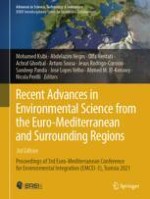2024 | OriginalPaper | Buchkapitel
Crop Diversification, a Challenge for Wastewater Treatment and Reuse in Tunisia: A Pilot Case Study
verfasst von : Karim Ergaieg, Mohamed Oussama Houij, Radhouane Hamdi
Erschienen in: Recent Advances in Environmental Science from the Euro-Mediterranean and Surrounding Regions (3rd Edition)
Verlag: Springer Nature Switzerland
Aktivieren Sie unsere intelligente Suche, um passende Fachinhalte oder Patente zu finden.
Wählen Sie Textabschnitte aus um mit Künstlicher Intelligenz passenden Patente zu finden. powered by
Markieren Sie Textabschnitte, um KI-gestützt weitere passende Inhalte zu finden. powered by
